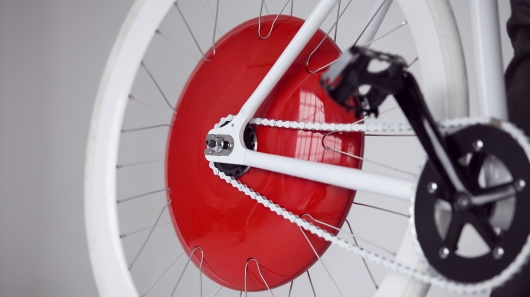MIT debuts the Copenhagen Wheel
By Paul Ridden
13:58 December 17, 2009 PST
Researchers from Massachusetts Institute of Technology's SENSEable City team have chosen the Copenhagen Conference on Climate Change to show off a new bicycle wheel prototype which not only provides electric rider assist, but also contains "a veritable Swiss army knife's worth of electronic gadgets and novel functions", including sensors to monitor air quality and noise pollution, GPRS and Bluetooth connectivity.
Unlike other electric assist solutions, the Copenhagen Wheel can be fitted to an existing bicycle. As the rider pedals away, the hub harvests energy from movement and braking and stores it for later use in the internal batteries. The hub also contains an electric motor (naturally), 3-speed gears and an array of sensors to give the cyclist information about his or her surroundings.
Sensing the environment
Environmental sensors detect and report carbon monoxide, nitrogen oxide and noise levels. The rider is provided with relative humidity and ambient temperature readings and the hub also includes a torque sensor and GPRS for speed, distance traveled and route information. The tech can even detect the presence of friends in the local vicinity.
As there is no external wiring, all of this information and more is transmitted via Bluetooth to the rider's smartphone (which can be secured to the bike's handlebars). Whether a bit of a boost is needed or it's just a case of taking it easy for a while, the smartphone is also used to control the level of motor assist and the gears as well as locking and unlocking the wheel. In essence it looks like an earlier MIT offering has received quite a bit of an upgrade.
In an interesting safety twist, bikes fitted with a Copenhagen Wheel could even alert owners if someone attempts theft and send back location reports, the project's Assaf Biderman explains: "the Wheel has a smart lock: if somebody tries to steal it, it goes into a mode where the brake regenerates the maximum amount of power, and sends you a text message. So in the worst case scenario the thief will have charged your batteries before you get back your bike."
Impressing the locals
The innovation has been well received by the locals, Ritt Bjerregaard, Lord Mayor of Copenhagen commented: "Our city's ambition is that 50 percent of the citizens will take their bike to work or school every day. So for us, this project is part of the answer to how can we make using a bike even more attractive."
Riders could even benefit directly if discussions about a reward scheme come to fruition. "One of the applications that we have discussed with the City of Copenhagen is that of an incentive scheme whereby citizens collect Green Miles - something similar to frequent flyer miles, but good for the environment," says Christine Outram, who led the team of MIT researchers.
It is hoped that a production version of the wheel will be available next year, pricing is unknown but is thought to be "competitive" with standard electric bikes. If the definition of "standard" is an Elmoto or Mosquito then it could be pricey, but if it is more in line with, or cheaper than the likes of the Gocycle, then it will no doubt attract much more interest.
Copyright © gizmag 2003 - 2009 To subscribe or visit go to: http://www.gizmag.com
